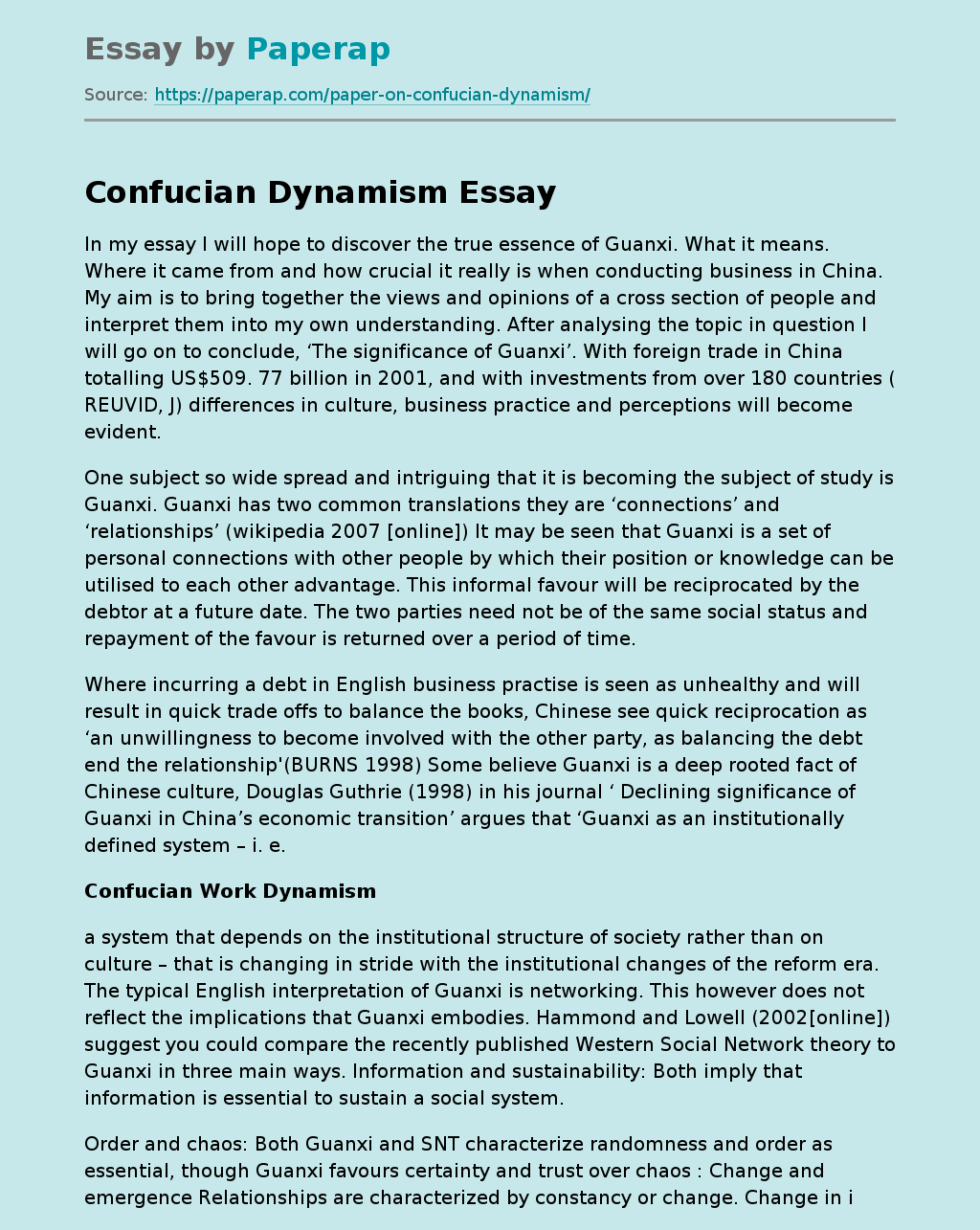Confucian Dynamism
In my essay I will hope to discover the true essence of Guanxi. What it means. Where it came from and how crucial it really is when conducting business in China. My aim is to bring together the views and opinions of a cross section of people and interpret them into my own understanding. After analysing the topic in question I will go on to conclude, ‘The significance of Guanxi’. With foreign trade in China totalling US$509. 77 billion in 2001, and with investments from over 180 countries ( REUVID, J) differences in culture, business practice and perceptions will become evident.
One subject so wide spread and intriguing that it is becoming the subject of study is Guanxi. Guanxi has two common translations they are ‘connections’ and ‘relationships’ (wikipedia 2007 [online]) It may be seen that Guanxi is a set of personal connections with other people by which their position or knowledge can be utilised to each other advantage. This informal favour will be reciprocated by the debtor at a future date.
The two parties need not be of the same social status and repayment of the favour is returned over a period of time.
Where incurring a debt in English business practise is seen as unhealthy and will result in quick trade offs to balance the books, Chinese see quick reciprocation as ‘an unwillingness to become involved with the other party, as balancing the debt end the relationship'(BURNS 1998) Some believe Guanxi is a deep rooted fact of Chinese culture, Douglas Guthrie (1998) in his journal ‘ Declining significance of Guanxi in China’s economic transition’ argues that ‘Guanxi as an institutionally defined system – i.
e.
Confucian Work Dynamism
a system that depends on the institutional structure of society rather than on culture – that is changing in stride with the institutional changes of the reform era. The typical English interpretation of Guanxi is networking. This however does not reflect the implications that Guanxi embodies. Hammond and Lowell (2002[online]) suggest you could compare the recently published Western Social Network theory to Guanxi in three main ways. Information and sustainability: Both imply that information is essential to sustain a social system.
Order and chaos: Both Guanxi and SNT characterize randomness and order as essential, though Guanxi favours certainty and trust over chaos : Change and emergence Relationships are characterized by constancy or change. Change in information flow creates change in social order. Both Guanxi and SNT offer a theory of change coupled with an ethic of sustainability where order is created by trust as a local, relative phenomena. In order to understand Guanxi you have to look at the environment in which it was conceived. China was for three decades a communist country.
During the chaos of the Cultural Revolution adults and their children faced being sent to the countryside or had the constant threat of denunciation. Individuals relied on the exchange of gifts and favours among personal connections to find ways to deal with these social crises. (GUTHERIE 1998) He suggests that Guanxi and gift giving have evolved together and work along side each other. The term business as we know it today did not exist. People worked for the state meeting quotas and in return their immediate needs were accommodated by their work unit.
Having good relationships with people was also a way of gaining things that were not made available to you. While a market economy emphasises marketing, financial and operational savvy, the planned economy places more importance of government relationships and Guanxi. (GULAIT and LEE 2004) Under Mao Zedong Guanxi thrived as a way of allocating investment in the absence of a market. Geoffrey Murry suggests it stems back further ‘during periods of strong rule, imperial powers reached into the furthest corners of the Chinese empire. The exercise of this power was arbirary and brutal; the mandarin was both prosecutor and judge.
A separate judiciary was never established, and hence the ordinary person never looked to the law to settle his grievances. ‘ He suggests that this tradition of looking around the law for the solution has carried on. If obligations of a person take over civic duty in order to satisfy Guanxi then is this not corruption? If one were to focus directly on Guanxi being reminisant with corruption then one would miss the positive implications Guanxi evokes. In order to educate a foreigner on Guanxi you have to look at the context in which it is used. Guanxi is not generally used to describe relationships within a family or with friends.
Anthropologists and theorists alike will try and depict differences in social interaction between countries. Research by Hofstede (1988 ) into organisational culture in the international arena shows that Chinese people’s short term orientations are that of protecting face, respect for tradition and reciprocal greeting and favours. He classifies theses as Confucian dynamism. Further observations have been made to try and distinguish Chinese culture characterists. How the Chinese view time. That they do not hurry decisions negotiations take longer then in the West.
Confucian Dynamism. (2019, Dec 05). Retrieved from https://paperap.com/paper-on-confucian-dynamism/

